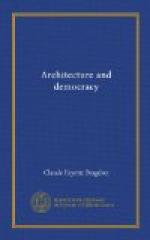Language like this stings and burns, but it is just such as is needful to shame us out of our comfortable apathy, to arouse us to new responsibilities, new opportunities. Mr. Sullivan, awake among the sleepers, drenches us with bucketfuls of cold, tonic, energizing truth. The poppy and mandragora of the past, of Europe, poisons us, but in this, our hour of battle, we must not be permitted to dream on. He saw, from far back, that “we, as a people, not only have betrayed each other, but have failed in that trust which the world spirit of democracy placed in our hands, as we, a new people, emerged to fill a new and spacious land.” It has taken a world war to make us see the situation as he saw it, and it is to us, a militant nation, and not to the slothful civilians a decade ago, that Mr. Sullivan’s stirring message seems to be addressed.
The following quotation is his first crack of the whip at the architectural schools. The problem of education is to him of all things the most vital; in this essay he returns to it again and again, while of Kindergarten Chats it is the very raison d’etre.
I trust that a long disquisition is not necessary in order to show that the attempt at imitation, by us, of this day, of the by-gone forms of building, is a procedure unworthy of a free people; and that the dictum of the schools, that Architecture is finished and done, is a suggestion humiliating to every active brain, and therefore, in fact, a puerility and a falsehood when weighed in the scales of truly democratic thought. Such dictum gives the lie in arrogant fashion, to healthful human experience. It says, in a word: the American people are not fit for democracy.
He finds the schools saturated with superstitions which are the survivals of the scholasticism of past centuries—feudal institutions, in effect, inimical to his idea of the true spirit of democratic education. This he conceives of as a searching-out, liberating, and developing the splendid but obscured powers of the average man, and particularly those of children. “It is disquieting to note,” he says, “that the system of education on which we lavish funds with such generous, even prodigal, hand, falls short of fulfilling its true democratic function; and that particularly in the so-called higher branches its tendency appears daily more reactionary, more feudal. It is not an agreeable reflection that so many of our university graduates lack the trained ability to see clearly, and to think clearly, concisely, constructively; that there is perhaps more showing of cynicism than good faith, seemingly more distrust of men than confidence in them, and, withal, no consummate ability to interpret things.”




